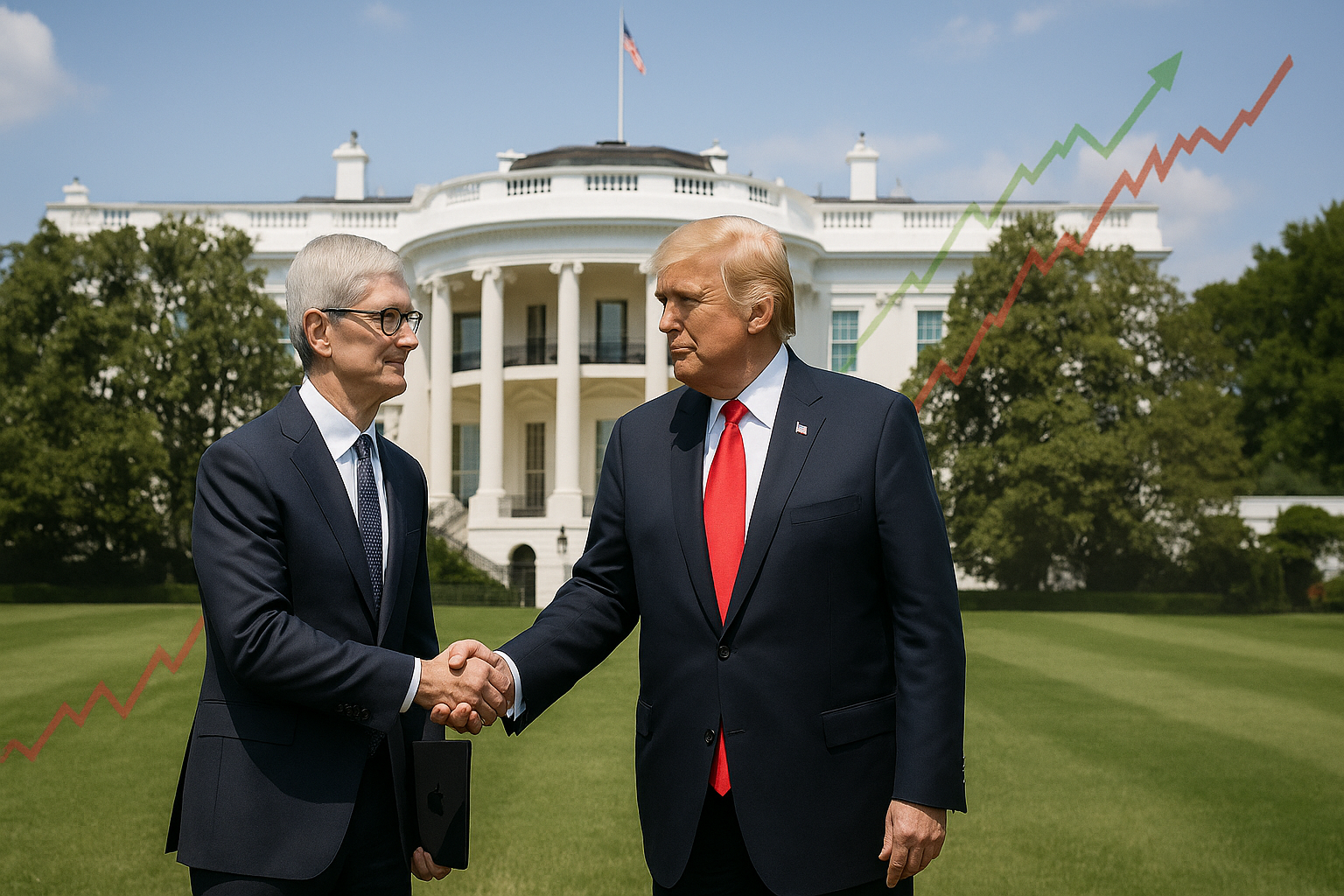Tim Cook just pulled off what might be the most profitable handshake in recent corporate history.
Apple's stock skyrocketed 13% this week—their biggest jump since the pandemic-fueled tech rally of 2020—after Cook's carefully orchestrated White House appearance alongside President Trump. That translates to roughly $200 billion in market value appearing almost out of thin air. Not bad for what amounted to a glorified photo op and some carefully worded promises about American manufacturing.
Look, I've covered tech diplomacy for years, and this was masterful. Cook pledged that Apple would spend $100 billion on American suppliers and components over the next four years. It sounds impressive until you remember that Apple's annual revenue is north of $350 billion. This "commitment" is essentially business as usual dressed up in red, white, and blue.
But here's the thing—in the bizarre world where stock markets and politics intersect, perception often matters more than the fine print.
The Political Chess Game
What we witnessed wasn't just a business announcement. It was corporate diplomacy played at grandmaster level. Cook—who's somehow maintained relationships across Washington's increasingly unbridgeable divide—appears to have secured the holy grail of regulatory arrangements: promise to do things you'd probably do anyway, and in return, get a shield against potential tariffs that could devastate your profit margins.
I spoke with several investment analysts who confirmed my suspicion: this was essentially buying insurance with money you were already planning to spend. One called it "the slickest corporate move I've seen all year."
The market response reveals something fascinating about investor psychology. For months, there's been this dark cloud of tariff uncertainty hanging over tech companies with global supply chains. Apple, with its heavy reliance on Chinese manufacturing (despite what the marketing materials might suggest), was especially vulnerable.
What Cook effectively did was purchase a tariff exemption without significantly altering Apple's fundamental business model. And Wall Street immediately calculated that this regulatory certainty was worth far more than whatever incremental costs might come from reshoring some procurement.
The Supply Chain Shell Game
Having tracked Apple's manufacturing strategy since the early 2010s, I've watched them perfect what you might call "supply chain theater." It works like this:
First, build a global production ecosystem so intricate and efficient that any significant disruption would cause genuine economic pain across multiple countries. Then, when political winds shift, emphasize whichever aspect of your business aligns with current priorities—American jobs, green manufacturing, technological leadership... whatever fits the moment.
(The cynical among us might call this having your offshore cake and eating it too.)
The genius of this approach? It's politically agnostic. During the Obama years, Apple highlighted environmental initiatives. Under Trump's first term, they emphasized their U.S. investments after tax cuts. Now, they're focusing on American manufacturing in an election year when both parties are pushing economic nationalism.
Apple isn't alone in this dance, of course. But they're arguably the best at it.
Relief Rally Psychology
What's particularly telling about this week's stock jump is how much of it represents pure relief rather than any fundamental change in Apple's business prospects. The company still faces serious challenges—slowing iPhone sales, questions about their AI strategy, regulatory pressure in multiple markets.
But none of that mattered this week. A major risk factor—potentially devastating tariffs—appears to have been neutralized. This is a textbook example of what traders call a "relief rally," where the removal of a negative carries more weight than any incremental positive.
I've witnessed this pattern repeatedly throughout market cycles... uncertainty creates a risk premium that suppresses valuations, and when that uncertainty resolves—even if the underlying business fundamentals haven't changed—the compression unwinds rapidly.
Sometimes violently.
Winners, Losers, and Lessons
There are broader implications here that deserve attention.
First, in our new era of economic nationalism, companies that can adjust their supply chains—or at least create the appearance of adjustment—will have a tremendous advantage. It's corporate Darwinism for the deglobalization age.
Second, these individual exemptions create winners and losers in ways that broad policy doesn't. Apple secured protection that smaller competitors simply can't negotiate. They lack both the economic leverage and the White House access.
And third? Markets are increasingly treating political risk as a primary concern rather than background noise. The magnitude of Apple's rally suggests investors are hypersensitive to policy shifts affecting global supply chains.
For the average investor, this creates a confounding reality. Companies that navigate the commerce-politics intersection effectively will command premium valuations. But those premiums can evaporate instantly if political winds shift.
In Apple's case, they've demonstrated once again why they're valued at nearly $3 trillion. It's not just about designing beautiful products—it's about creating a business model so vital to multiple economies that governments will accommodate rather than disrupt it.
And that, perhaps more than any product innovation, may be Tim Cook's most enduring legacy at Apple. Not the gadgets, but the political architecture that protects them.
